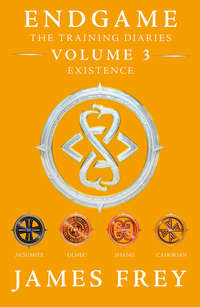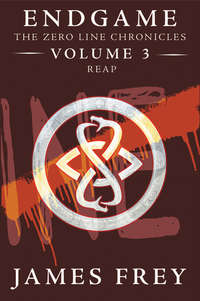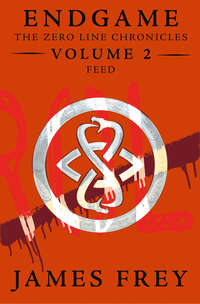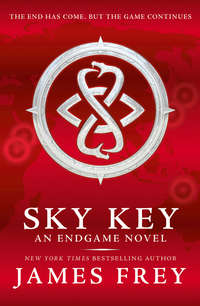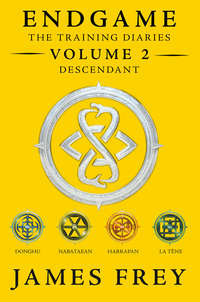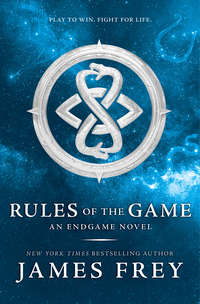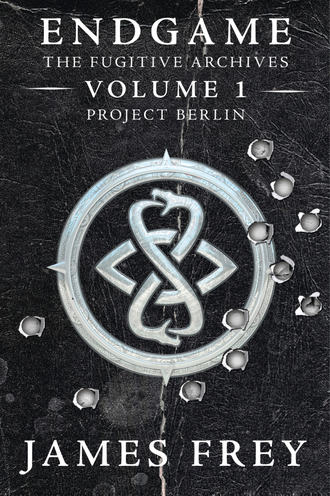
Полная версия
Project Berlin
Of course, none of this matters if I can’t get Sauer to cooperate. I was hoping that my killing the MGB agents who came for him would be proof enough that I’m one of the good guys. Then again, maybe I’m not. At least not in Sauer’s eyes. It’s funny how your perspective changes depending on which end of a gun you’re on.
I reach the kitchen in time to see Sauer step through a door to a pantry. The girl is ahead of him. “Run, Lottie,” he shouts as he pulls the door closed. “Go now!”
He’s holding the door shut from the other side. Or trying to. I step back and aim a kick at the handle. The wood splinters as Sauer cries out. I kick it again, and it flies open. Inside the pantry, Sauer stands staring at me as, behind him, the girl disappears through another door that was hidden by shelves filled with jarred foods. A secret passage.
Sauer turns, grabs a jar of pickled beets, and hurls it at me. I dodge, and it hits the wall behind me, shattering and staining the wallpaper with red juice. He grabs another jar, and another. He’s panicking. This gives me an advantage over him.
“I don’t want to hurt you,” I tell him, keeping my voice low and calm, as if I’m speaking to a frightened animal. I set the American’s gun on a nearby tabletop and hold my hands up to show him that I’m now unarmed, at least as far as he knows. In reality, I remain as deadly as ever. “I want to help you,” I continue. “I can get you out of Berlin. You and the girl. To safety.”
He pauses, a jar in his hand. “Who are you?” he asks.
“A friend,” I tell him.
“Some friend,” says a voice from the hallway.
I turn and see GI Joe standing there. He’s holding my own gun, and it’s pointed at me.
“I figured since you coldcocked me with mine, you wouldn’t mind if I borrowed yours,” he says. Then, addressing Sauer, he says, “She’s going to turn you over to the Soviets. They have a bounty on your head, and she plans to collect it.”
I see Sauer’s face contort in fear. Then, with a glance at the American, he throws the jar of sauerkraut in his hand at my head. I duck. Sauer turns and darts into the opening behind him. He pulls the shelves shut with a bang. I start to run after him, but a bullet whizzing past my head stops me. It just misses, and inside the pantry, several jars of pickles meet their deaths.
“I missed on purpose,” the soldier says. “Next time I won’t. Now turn around.”
I do as he says. But even as I do, my mind is working out my options, formulating a plan. “He’s getting away,” I say.
“That’s kind of the idea,” he tells me. “Well, the idea is for him to get away from you. I can find him again.”
He sounds sure of this, and I wonder why. Was he assigned to protect Sauer and the girl? But then why did they run away when we were fighting? If they were so sure of him, wouldn’t they stay? Maybe, I think, he wasn’t protecting them; maybe he was waiting to claim them for himself. Still, I can’t help but be impressed by his confidence. Also by the fact that he came to much sooner than most people would have after I’ve hit them.
“Why don’t we start by you telling me exactly who you are?” he says. “I made up that stuff about the Soviets, although it’s obviously true that they want him, right?”
There’s no point in lying about this because he’s going to be dead in a minute, so I nod.
“But you’re not Russian, are you?”
“No,” I tell him. “I’m not.”
“And I don’t think you’re German,” he says. “So what are you? French?”
I snort. I wonder what he would say if I told him I was Minoan. Would he even know what that means? Instead, I say, “I’m Greek.”
“Greek?” he repeats. “How about that. Well, I guess Greece has no love for the Nazis either.”
This is true. Hitler’s army did untold damage to my country and killed many of our people. But I’m not here to discuss history with an American soldier, and with every second we spend talking, Sauer is getting farther and farther away. I say nothing.
The soldier waves the gun at me, as if this will encourage me to answer him. “What’s your business with Sauer?”
Does he really not know? I don’t see how this is possible. Anyone who would take the time to find Evrard Sauer would have to know who he is. For one thing, he’s been living under a different name.
Maybe, I think, the American is testing me to see what I know. Since he’s wasting my time, I decide to play with him. “The Nazis took many things from my country. Including works of art from our museums. They’ve been hidden somewhere and haven’t been found. Sauer knows where they are.”
He looks puzzled. “You just killed two people so you could kidnap a … museum director?”
“An art historian,” I lie. “And what was taken from us is priceless. It’s our history. Your country is young, so perhaps you don’t understand.”
He shakes his head. “This doesn’t make any sense.” He sounds as if he’s speaking to himself, not to me. I take the opportunity while his attention is elsewhere to look around the kitchen. I see a knife on the counter beside the sink. I could use that, if I could get to it. But even closer is a bag of flour.
I snatch the bag and hurl it at the soldier’s head. He reacts immediately, bringing the pistol up and firing, exactly as I’d hoped he would. The bullet hits the bag, and the paper wrapper explodes. A cloud of flour erupts, filling the air like a snowstorm. The soldier is completely hidden from view, which means he can’t see me either.
I run into the pantry and pull on the shelf hiding the secret entrance. Luckily, there’s no trick to it, and it flies open. A set of stairs leads down into a brick-lined tunnel. I step inside, pull the shelves closed, and look for a way to secure it so the soldier can’t follow me, at least not easily. I’m surprised to discover that the back of the door is covered in metal sheeting, and that there’s actually a very solid bolting mechanism attached to it, making it easy to secure from this side and virtually impossible to open from the other. Sauer must have been in too much of a panic to bother with it. Or he hoped that I wouldn’t be in any condition to chase him.
I lock the door. A moment later, the pounding begins.
I ignore it, knowing that the American can’t get through, at least not for a while. Now it’s time to turn my attention back to Sauer. I wonder how far he’s gotten and if I can catch up with him. Everything is now in question. At least the American is no longer in my way. I run down the tunnel I now find myself in, leaving him to whatever the Fates have in store for him. My own destiny lies ahead of me in the darkness, and I rush to meet it.
CHAPTER 3
Boone
It becomes clear pretty quickly that I’m not going to be able to open the door. From this side it looks like an ordinary door, one I should be able to kick down, or at least shoot my way through. But as my aching foot and the bullets lodged in the wood prove, this isn’t the case. This door has been designed to keep anyone from getting through it. Whoever installed it meant business.
Berlin is riddled with former safe houses, places where people who might have reason to hide could hole up and wait until the coast was clear. My line has a safe house here as well. I’m supposed to take Sauer to it and await extraction instructions. Now, unless I can get through this door and catch up to him, I’ll be waiting in that house alone, trying to figure out how to explain to my council how I let a girl get away with my prize. An amazingly smart girl, and one who was able to knock me out, but nobody’s going to care about that part. All they’ll care about is that she took what should be mine.
I stare at the door, trying to figure out a way through it, my frustration growing. Then I hear my trainer’s voice in my head. If you can’t go through, then go around, go under, or go over. He used to put me in seemingly impossible situations and make me figure a way out. A nine-foot wall I had to scale. A rushing river to get across. A trap to get out of. Anything to force me to think differently. There’s always a way. Always.
I start by asking myself what’s behind the door. While it’s possible that the door leads to just another room, it’s more likely that it leads to some kind of an exit. And if there’s an exit, I should be able to find it. But I’ve already lost a lot of time trying to get through. I have to hurry.
The kitchen has another door leading to the backyard, but it’s boarded up, and there’s no time to pry the boards off. So I run back down the hallway and out of the house, a cloud of flour flying around me. I have to admit, the girl’s trick was pretty clever, even if she has made me look like a fool twice now. And I still don’t know who she is or what she’s doing here. She’s become a mystery that I’m determined to solve. First, I have to catch her.
Getting into the backyard of Sauer’s house is as simple as running through the downstairs of the deserted house next door and climbing over a fence into the small yard. I stop and survey, sketching a map in my head. There is a set of steps leading down to a cellar, but I know this isn’t where the secret passage comes out. The whole point is to get as far away from the house as possible before you have to come up into the open. Most likely, it runs the length of the yard, then opens up into a sewer system or some other network of already-established tunnels.
I cross the yard and climb over yet another fence. This street looks much like the one I’ve just left, a row of town houses, many of them bombed out and empty. The tunnel could lead to, or pass under, any of them. With each second taking Sauer farther away from me, I run in one direction, hoping to find something that will provide a clue.
I find it in the form of a garden. It appears as a small break in the line of houses, really just an empty space where normally another building would have been. Instead, there’s a gated fence behind that sits on a lot that contains a small fountain, a bench, and a toolshed.
It’s the shed that interests me. It’s the perfect spot for an underground tunnel to come out. Then, as I peer through the bars, I see something else: footprints coming out of the shed. Everything in the garden is covered in snow, so the footsteps are easy to see. And there’s more than one set of them. They lead to the opposite side of the lot, where another gate opens onto another street. The gate is open, and the footsteps continue through it. My guess is that the girl has recently passed through there with Sauer and Lottie.
The gate on my side is locked, but it’s easy enough to scale the fence and get inside the garden. I run to the other side and follow the footprints. The street is deserted, so it’s easy to see them. But then they turn onto another street filled with people and disappear into the crowd. I scan the block for the mystery girl, Sauer, or Lottie, but there are too many bodies, and everyone seems to be wearing heavy coats that look the same. Between that, the dark, and the snow, my chances of finding them are almost nonexistent.
Then something crunches under my foot. Curious, I bend down to see what it is. It’s a candy. A toffee, wrapped in cellophane. I think back to the gift that Sauer gave the girl. It can’t be a coincidence. Candy is heavily rationed, and it’s unlikely someone would just drop one by accident.
I start walking and find another about 20 feet farther on, then another. Now I’m certain that they weren’t dropped by accident. Someone has left me a trail to follow.
It’s not easy searching for them in the snow, and I’d look crazy shining my flashlight around, but the light from the streetlamps helps. I see a sparkle and find another candy. I pick it up and add it to the growing lump in my coat pocket. Approximately every 20 feet, I find another one, although sometimes there are gaps where either the candy has been kicked away or perhaps picked up by somebody else.
The trail of toffees leads down the street and around a corner, where it comes to an end. Then I notice a child, a little boy of about four or five. He and his mother are standing together. He’s holding something in his hand. As I watch, he unwraps it and puts it into his mouth.
“What is that?” his mother asks.
The boy shrugs. “Candy?” he says doubtfully.
His mother, clearly alarmed, snatches the wrapper from his hand and looks at it. “Where did you get this?”
The boy points. “A man gave it to me,” he said. “As he was getting on that streetcar.”
I turn my head just in time to see a streetcar rounding a corner at the end of the street, tethered to the electric line above it. I run to the boy and his mother. “Where does that streetcar go?”
The woman puts her arm around the boy and draws him closer to her. “To the Soviet sector.”
I thank her and take off after the streetcar. It’s not going very fast, but it’s difficult to keep pace running on the slippery pavement. Also, if the mystery girl is keeping an eye out for me, I don’t want her to see me running behind the streetcar like a madman. I still don’t know if she’s caught up with Sauer and Lottie, or if she’s trying to follow them too. Until I can figure out which of them—or any of them—is on the streetcar, I need to be careful.
Fortunately, the streetcar makes frequent stops to let people on and off, which gives me a chance both to rest and to try to get a glimpse inside. Unfortunately, the cold has made the windows frosty, and I can’t see through them. And if the girl is with Sauer and Lottie, I don’t want to get on and risk a confrontation in front of so many people. So I watch to see if Sauer or either woman gets off, but they don’t. I can only hope that I’m right about them being on it.
Once again I wonder who the girl is. Twice now I’ve had the chance to kill her, and twice I haven’t. I can’t explain why, except that, for reasons I don’t entirely understand, I want to know who she is. And it’s not just that she’s undeniably beautiful. It’s more than that. There’s something about her that at the same time feels both very familiar and completely foreign. For one thing, she also could have killed me but didn’t. And I know she has no problem killing. She took down the two MGB agents without blinking. No ordinary soldier would do that—or even be able to. You have to be a certain kind of person to kill so easily, or at least to make it look so easy.
Someone like a Player, I think.
Maybe my line isn’t the only one that’s after Sauer. Maybe the girl is Playing too.
She’s the right age. Also, she’s a, well, she. Most militaries don’t train women to fight. They’re mainly nurses or some other kind of noncombat personnel. Yet she fights like a soldier—a highly trained soldier. She had to learn it somewhere, and despite her remark about street fighting, there’s no way she got this good from a couple of brawls on a playground.
If she is Playing, then the question is: for which line? She said she was Greek, so if she wasn’t lying, she’s a Minoan. If another line wants Sauer badly enough to kill for him, then what he knows has to have some bearing on Endgame. I don’t believe for one second the girl’s story about him being an art historian. Something bigger is happening here. Once again, I question why my own council hasn’t told me what it is.
I think again of how she reminds me of Wonder Woman. The Amazon princess. What was her real name? Diana Prince. Maybe that’s what I should call her. Diana. Diana was also the goddess of the hunt, so it fits there too. We’re both hunters, after the same quarry. Has she already caught them? I still don’t know.
The streetcar stops, and again the doors open. I peer through the open door as people get out, and just for a second I see a face looking back at me. It’s Sauer. Our eyes meet, and a look of panic appears on Sauer’s face. His eyes dart away, then back to me, and for a moment I think he’s about to run off the streetcar. Then the doors close.
What did the look mean? Was he afraid because he saw me? Or was it because Diana was with him, making sure he didn’t get away? I don’t know. But now at least I know that he’s on the streetcar, and it renews my desire to follow it wherever it goes.
When the streetcar crosses from the American sector to the Soviet sector, I worry for a moment that I might be stopped. Although people are still free to move around the city, an American soldier walking into Soviet territory could be suspicious. But it’s Christmas Eve, and lots of people are going back and forth to visit friends and family, so I risk it. As I walk past the big sign announcing YOU ARE LEAVING THE AMERICAN SECTOR, I barely get a glance from the grim-faced Red Army soldiers standing around cradling their rifles in their arms.
Even though it’s the same city, the Soviet sector of Berlin feels different. There’s a tenseness here, as if the residents and even the buildings are holding their breaths. The people walking around seem to be in a hurry to get wherever it is they’re going. Instead of looking at one another, they look at the ground. Even the snowfall seems heavier here, the cold more biting. I pull up the collar of my coat and glance over my shoulder, more on guard than usual.
The streetcar makes less frequent stops as it moves deeper into Soviet-controlled territory. Thanks to the snow and the outdated and unreliable overhead wires that power the streetcar, it moves slowly enough that I can keep up with it without having to do an all-out run. Then it stops at the corner of a street lined with nondescript apartment buildings, and half a dozen people get off. Three of them detach from the group and walk away, and as they pass through the glow of a streetlight I see that one of them is wearing a red scarf. Sauer. And the other two are Lottie and Diana.
The trio walks quickly. Diana stays one pace behind the other two. I wonder if they’ve come willingly or if she’s got a gun to their backs. If she’s a Player too, Sauer is the one she wants, so perhaps she’s told him she’ll kill Lottie if he doesn’t play along. As my father always says, love is the greatest danger of all. It’s why he’s warned me not to fall in love until I’m no longer a Player. When you have something you’re afraid of losing, it gives your enemies a weapon to use against you.
Three blocks later, the group walks into a building that looks like all the other ones on the street. Five stories tall. Surprisingly undamaged. They disappear through a door, and I wait outside across the street. I keep my eyes on the windows, scanning the floors in an orderly manner from top to bottom, then back up. As I’m scanning for the fourth time, a light goes on. I note which apartment it is. Fourth floor, third from the left.
“Bingo,” I say aloud. “Got you.”
CHAPTER 4
Ariadne
I am not happy about how things have played out.
As I draw the shade on the window facing the street, I wish that the Minoans had a safe house in Berlin. But we do not, and so advance agents set up this apartment, which is occupied by an elderly woman of our line who calls herself Lydia. Sixty years ago she was known by another name, one that is familiar to all Minoan Players. She was one of our greatest, a legend. Often when one of my class of candidates was struggling during an exercise, our trainers would yell, “Europa would be at the top of that cliff by now!” or some such thing. Often, I pictured her in my mind, fighting or swimming beside me, urging me on. Now she looks like one of the yia yias who crowd the markets of Greece, haggling over the price of olives and fish, yet still I feel I am in the presence of a great fighter.
“Do you think you were followed?” Lydia asks as she stirs the pot of avgolemono soup on the stove. She tastes it, then adds more salt. As I smell it, my mouth waters.
I’ve told her about the American soldier. I had to, as his interference prevented us from following our original plan, which was to have my compatriots meet me at the house where Sauer was hiding and take him by car out of the city. Instead, I had to take the extremely risky move of getting on the streetcar and coming here. By now, Theron and Cilla will have realized that something has gone wrong and should also be making their way here.
“I don’t think so,” I say.
“You’re not sure?”
Once a Player, always a Player, I think to myself.
“I didn’t see him anywhere,” I tell her. “But it’s dark, and I was focused on making sure Sauer and the girl didn’t try to run.”
Lydia ladles soup into a bowl and carries it to the table. “You worry too much,” she says, patting me on the cheek.
“Perhaps you don’t worry enough,” I reply gently. I am not arguing with her, as I respect her too much. Also, she reminds me of my own grandmother.
She laughs. “Sit,” she says. “Eat. Theron and Cilla will be here soon, and then you’ll be on your way.”
“In a minute,” I tell her. “First, I need to speak with our guest.”
I pass through the living room, ignoring the girl, who is tied to a kitchen chair, a cloth around her mouth to prevent her from calling out. I go into one of the bedrooms, where Sauer is likewise tied up, and I shut the door behind me. I go to him, remove the gag, and sit on the edge of the bed.
“Who are you?” he asks.
There is no point in lying, so I tell him. “My name is Ariadne Calligaris.”
“You are not Russian,” he says.
“No.”
“What do you want with me?”
“You were working on a project involving a weapon,” I say. “We want that weapon.”
“Who is we?”
This I do not tell him. Instead I say, “The weapon is of alien design. You were asked to build it, or rebuild it, from plans that the Nazis discovered.”
He looks genuinely surprised but says nothing.
“There is going to be a war,” I continue. “A war that will make this most recent one look like a child’s game. The weapon you discovered may decide who wins and who loses.”
He shrugs. “Why do I care who wins?”
“Maybe you don’t. Maybe you don’t care if you live or die. I think you do care whether the girl out there lives or dies.”
Sauer looks at me, and I know that I’m right. Actually, I knew already, as my threat to shoot her if either of them tried to run is what allowed me to get them here after escaping from the American. At first I was irritated by the unexpected presence of the girl. Now I am grateful for her, as I can use her as a bargaining chip in dealing with Sauer.
“I don’t have the weapon,” he says.
“Where is it?”
“Destroyed,” he says. “In the bombing. Along with the blueprints.”
I stand up and take my weapon from its holster. “Then I have no need for you or the girl,” I say, chambering a round. I walk to the door and put my hand on the knob.
“Wait,” he says, as I knew he would.
I turn and look at him, saying nothing.
“I don’t have them,” he says. “But I know where they are.”
“Are they in Berlin?”
He nods.
“Can you get to them?”
“I don’t know.”
“You have half an hour to decide,” I tell him as I open the door. I shut it behind me, leaving him to think about his situation. I don’t know if he’s telling the truth or not. He might be trying to buy time. If he’s lying and the weapon and the plans really have been destroyed, it will be unfortunate for him. Some of what he’s discovered will still be in his head, and we can’t allow him to live with that information. It’s too valuable.
I return to the kitchen and sit down at the table. Lydia sits down across from me. She doesn’t speak, but her lifted eyebrows ask a question.
I know the girl is listening from the living room, and even though I have no reason to think that she speaks Greek, I don’t want to say too much. “The soup is wonderful,” I say to Lydia. “You’ll have to give me the recipe. I had it, but it might have been lost.”
She nods to show she understands my meaning: Sauer might or might not have what we want. And as I told him, he has until Theron and Cilla arrive to make up his mind. Until then, there is nothing else I can do, so I eat Lydia’s soup and think about how, if all goes well, in a few days I’ll be back in Greece with this mission behind me, and perhaps something that will greatly strengthen the Minoan line’s resources. If I am successful, my name will perhaps join Europa’s in the list of the great Players. Second only to winning Endgame itself, this would be a great achievement, and it would show my council that they chose the right Player.



